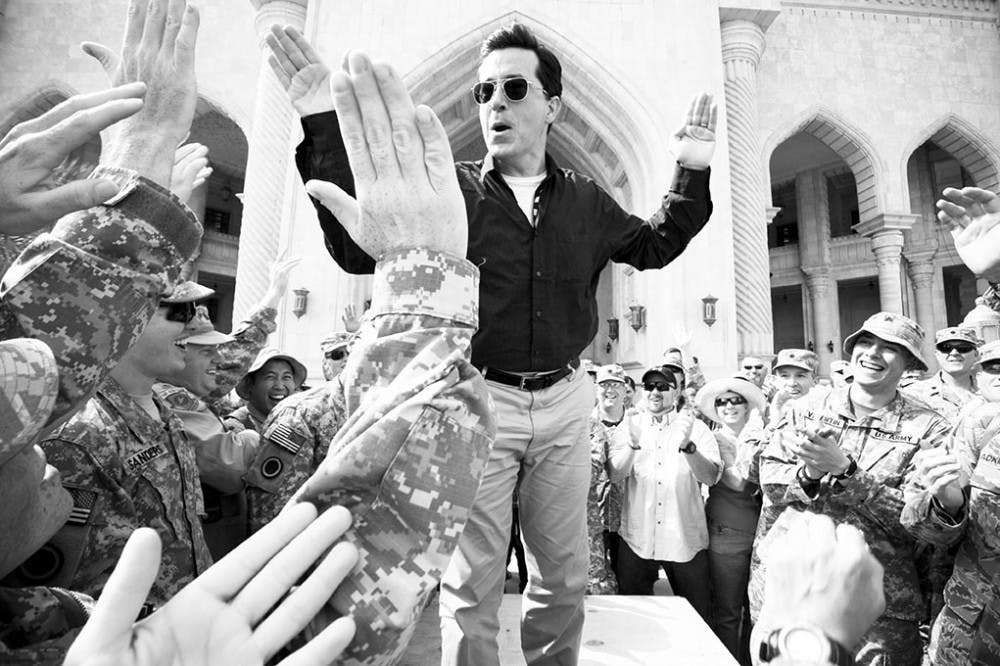Late night television has seen many different eras over the past several decades, creating stars out of people like Ed Sullivan, Jay Leno and David Letterman.
Now, a new generation of talk television hosts has taken a new generation of viewers by storm, to media and critical praise with a large viewership in tow.
Among the men who have led the charge into the new era of late night are Jimmy Fallon, Stephen Colbert and John Oliver.
Oliver is a bit of an outcast, presenting his show “Last Week Tonight” on HBO, which is not a traditional venue for late night talk shows. The only other show to compare to Oliver’s on HBO is “Real Time with Bill Maher” which has seen a steady decrease in viewership since the appearance of Oliver.
Oliver, who learned from Comedy Central legend Jon Stewart as a writer and guest commentator on Stewart’s “Daily Show,” is one of the more controversial television personalities of the new generation: A British-born comedian who satirizes the American government, with an often liberal point of view.
Oliver’s viewership is also the only viewer base that needs to be looked at from multiple angles, through TV airings, on-demand views, HBO Go and YouTube views.
Because of Oliver’s lack of availability being on HBO, much of Oliver’s work receives its views from YouTube.
Between all of these formats, “Last Week Tonight” boasted an average viewership of 4.1 million weekly viewers during its first season on HBO, rivaling the mainstream cable late night shows of Fallon and Jimmy Kimmel.
Considering the show popped up seemingly out of nowhere, this is no small feat for the British comedian.
Also leading the charge is another Comedy Central veteran, Colbert, who hosted “The Colbert Report” for close to 10 years before jumping to CBS to take the reins on “The Late Show.”
Colbert has seen a massive viewership in his first few weeks as a host, with 6.55 million viewers during his first episode and an average rating of 4.9 from Nielson ratings, which beat out contemporaries Fallon and Kimmel for the first week.
Colbert’s ratings quickly dropped, but only into the second place position, sitting behind “The Tonight Show with Jimmy Fallon.”
Colbert brought his style straight from his Comedy Central show and held nothing back in his first weeks, inviting influential people (including presidential candidates) to come on the show with him.
The only difference between the Comedy Central show and Colbert’s new position is that he has opted to ditch the over-the-top character that he used to make his points on Comedy Central.
The rush of presidential candidates to CBS is surely a contributing factor in Colbert’s ratings and his critical reviews.
After six Emmy wins as the host of “The Colbert Report” and his move to CBS, it is safe to say that Colbert is one of the most influential talk television hosts of his generation, bringing in a younger crowd and a new sense of urgency to late night TV.
The king of late night is currently the “Saturday Night Live” (SNL) veteran Jimmy Fallon, who took over “The Tonight Show” on Feb. 17, 2014, and has run more than 300 episodes, with Fallon signing a contract to keep his seat behind “The Tonight Show” desk until at least 2021.
If Fallon sticks to his guns with “The Tonight Show,” it is possible he could be there for a decade or more, rivaling previous hosts such as Johnny Carson.
Fallon works with executive producer Lorne Michaels, who is known as the mastermind behind SNL.
The two SNL greats have turned “The Tonight Show” into a cultural phenomenon with no end in sight.
Fallon had the highest viewership in 20 years, with “The Tonight Show” averaging 8.49 million viewers for the week, according to Nielson ratings.
Since its debut, the show has consistently beaten all of its competitors in ratings competitions.
This new cast of late night television hosts has seen the average age of viewers decrease and the cultural impact of the shows increase greatly.
Young adults are tuning in to late night television more than ever before and making a large impact in ratings and viewership numbers.
Despite the viewership numbers, “The Tonight Show” has received more than its fair share of flack for being too gimmicky, which has always been a trademark of Fallon.
Nonetheless, Fallon is still leading the charge for this new generation of late night stars.
The days of the clean-cut antics of Sullivan and Carson are well in the rearview mirror as this new cast surges forward, taking no prisoners and leaving no funny jokes untold.
The jokes have become raunchier for some and new ridiculousness has ensued on a level that has not been seen before from mainstream television hosts.
Oliver has gone as far as hiring lawyers to help him create a church for him to prove a point about organized religion and churches receiving tax breaks, during one of his shows. The stunt has been compared to Stephen Colbert’s super PAC that was created while Colbert was still on Comedy Central.
Oliver and Colbert have the ability to flip late night television on its head and cause a little mayhem along the way.
It has yet to been seen how far the ridiculousness will go with this new batch of hosts, but given their track records, the next decade of late night comedy is sure to be one that will make history and re-write history books.
This article is a commentary piece by Tyler M. Law. It does not reflect the thoughts and opinions of The Slate, nor Shippensburg University.




The Slate welcomes thoughtful discussion on all of our stories, but please keep comments civil and on-topic. Read our full guidelines here.